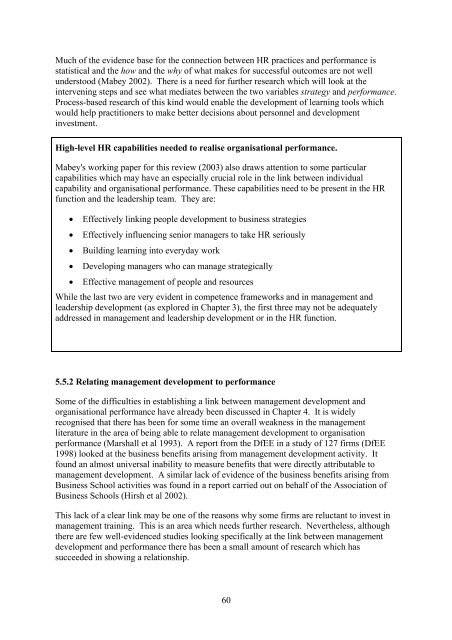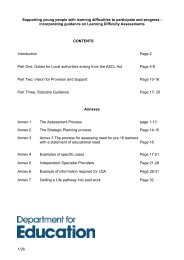The Development of Management and Leadership Capability and its ...
The Development of Management and Leadership Capability and its ...
The Development of Management and Leadership Capability and its ...
You also want an ePaper? Increase the reach of your titles
YUMPU automatically turns print PDFs into web optimized ePapers that Google loves.
Much <strong>of</strong> the evidence base for the connection between HR practices <strong>and</strong> performance is<br />
statistical <strong>and</strong> the how <strong>and</strong> the why <strong>of</strong> what makes for successful outcomes are not well<br />
understood (Mabey 2002). <strong>The</strong>re is a need for further research which will look at the<br />
intervening steps <strong>and</strong> see what mediates between the two variables strategy <strong>and</strong> performance.<br />
Process-based research <strong>of</strong> this kind would enable the development <strong>of</strong> learning tools which<br />
would help practitioners to make better decisions about personnel <strong>and</strong> development<br />
investment.<br />
High-level HR capabilities needed to realise organisational performance.<br />
Mabey's working paper for this review (2003) also draws attention to some particular<br />
capabilities which may have an especially crucial role in the link between individual<br />
capability <strong>and</strong> organisational performance. <strong>The</strong>se capabilities need to be present in the HR<br />
function <strong>and</strong> the leadership team. <strong>The</strong>y are:<br />
• Effectively linking people development to business strategies<br />
• Effectively influencing senior managers to take HR seriously<br />
• Building learning into everyday work<br />
• Developing managers who can manage strategically<br />
• Effective management <strong>of</strong> people <strong>and</strong> resources<br />
While the last two are very evident in competence frameworks <strong>and</strong> in management <strong>and</strong><br />
leadership development (as explored in Chapter 3), the first three may not be adequately<br />
addressed in management <strong>and</strong> leadership development or in the HR function.<br />
5.5.2 Relating management development to performance<br />
Some <strong>of</strong> the difficulties in establishing a link between management development <strong>and</strong><br />
organisational performance have already been discussed in Chapter 4. It is widely<br />
recognised that there has been for some time an overall weakness in the management<br />
literature in the area <strong>of</strong> being able to relate management development to organisation<br />
performance (Marshall et al 1993). A report from the DfEE in a study <strong>of</strong> 127 firms (DfEE<br />
1998) looked at the business benef<strong>its</strong> arising from management development activity. It<br />
found an almost universal inability to measure benef<strong>its</strong> that were directly attributable to<br />
management development. A similar lack <strong>of</strong> evidence <strong>of</strong> the business benef<strong>its</strong> arising from<br />
Business School activities was found in a report carried out on behalf <strong>of</strong> the Association <strong>of</strong><br />
Business Schools (Hirsh et al 2002).<br />
This lack <strong>of</strong> a clear link may be one <strong>of</strong> the reasons why some firms are reluctant to invest in<br />
management training. This is an area which needs further research. Nevertheless, although<br />
there are few well-evidenced studies looking specifically at the link between management<br />
development <strong>and</strong> performance there has been a small amount <strong>of</strong> research which has<br />
succeeded in showing a relationship.<br />
60
















